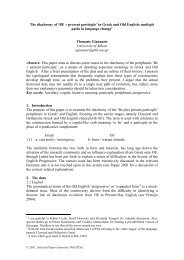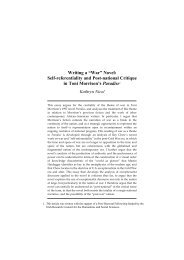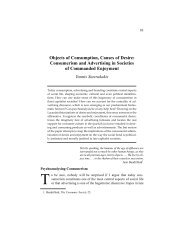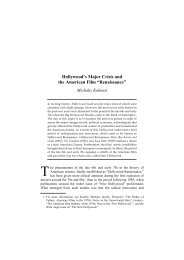19 International Symposium on Theoretical and Applied Linguistics ...
19 International Symposium on Theoretical and Applied Linguistics ...
19 International Symposium on Theoretical and Applied Linguistics ...
Create successful ePaper yourself
Turn your PDF publications into a flip-book with our unique Google optimized e-Paper software.
G E N E R A L S E S S I O N<br />
Past tense producti<strong>on</strong> by Greek speaking patients with Parkins<strong>on</strong>’s disease<br />
1 Stavroula Stavrakaki, 2 Zoe Katsarou, 3 Sevasti Bostantjopoulou & 4 Harald Clahsen<br />
1&3 Aristotle University of Thessal<strong>on</strong>iki, 2 Hippokrati<strong>on</strong> Hospital, Thessal<strong>on</strong>iki & 4 University of Essex<br />
1 svoula@auth.gr, 2 zoekatmd@otenet.gr, 3 bostkamb@otenet.gr & 4 harald@essex.ac.uk<br />
This study aims at testing the hypothesis that dysfuncti<strong>on</strong> of basal ganglia <strong>and</strong> fr<strong>on</strong>tal lobe circuits in<br />
Parkins<strong>on</strong>’s Disease (PD) affects the procedural brain memory <strong>and</strong>, in particular, grammatical rules<br />
(Ullman et al. <str<strong>on</strong>g>19</str<strong>on</strong>g>97), by studying the producti<strong>on</strong> of past tense forms by Greek-speaking patients with<br />
PD. Current studies of the past tense in PD revealed c<strong>on</strong>troversial results with respect to the patients’<br />
ability to produce regular <strong>and</strong> irregular past tense forms. On the <strong>on</strong>e h<strong>and</strong>, some researchers suggest<br />
that PD patients are performing better <strong>on</strong> irregular than regular past tense forms (Ullman et al. <str<strong>on</strong>g>19</str<strong>on</strong>g>97)<br />
whilst others report no impairments in the regular past tense (L<strong>on</strong>gworth et al. 2005; Penke et al.<br />
2005). As far as Greek-speaking PD patients are c<strong>on</strong>cerned, Terzi et al. (2005) found that they<br />
produced high correctness scores for regular <strong>and</strong> irregular verbs of existing verbs <strong>and</strong> showed no<br />
dissociati<strong>on</strong> between regular <strong>and</strong> irregular past tense formati<strong>on</strong>.<br />
In this study, we tested 27 n<strong>on</strong>-demented patients with PD recruited from the 3 rd Neurological Clinic<br />
of the University of Thessal<strong>on</strong>iki <strong>and</strong> 30 normal c<strong>on</strong>trols matched to PD patients <strong>on</strong> chr<strong>on</strong>ological age<br />
<strong>and</strong> years of educati<strong>on</strong>. The patients were classified into different stages according to the Hoehn &<br />
Yahr scale (Hoehn & Yahr <str<strong>on</strong>g>19</str<strong>on</strong>g>67) while their kinetic symptoms (akinesia included) were assessed by<br />
the Unified Parkins<strong>on</strong>’s Dementia Rating Scale (UPDRS) (Fahn et al. <str<strong>on</strong>g>19</str<strong>on</strong>g>87) <strong>and</strong> their mental abilities<br />
were assessed by the Dementia Rating Scale (DRS) (Mattis <str<strong>on</strong>g>19</str<strong>on</strong>g>88).<br />
The experimental task was an elicited producti<strong>on</strong> task supported by pictures <strong>and</strong> designed to elicit<br />
sigmatic <strong>and</strong> n<strong>on</strong>-sigmatic past tense forms.<br />
The experimental material c<strong>on</strong>sisted of<br />
(i) Existing sigmatic <strong>and</strong> n<strong>on</strong>-sigmatic verbs<br />
(ii) Sigmatic <strong>and</strong> n<strong>on</strong>-sigmatic novel verbs rhyming with sigmatics <strong>and</strong> n<strong>on</strong>-sigmatic verbs<br />
(iii) Novel n<strong>on</strong>-rhymes that do not allow ‘analogical’ recall of sigmatic <strong>and</strong> n<strong>on</strong>-sigmatic forms<br />
The results indicated that PD patients showed high level of correct performance <strong>on</strong> the producti<strong>on</strong><br />
of existing sigmatic <strong>and</strong> n<strong>on</strong>-sigmatic forms <strong>and</strong> provided no evidence for a dissociati<strong>on</strong> between<br />
regular <strong>and</strong> irregular inflecti<strong>on</strong>, a finding that is in line with Terzi et al. (2005). Furthermore, the<br />
patients produced a high number of sigmatic resp<strong>on</strong>ses for sigmatic <strong>and</strong> n<strong>on</strong>-sigmatic rhymes,<br />
similarly to the c<strong>on</strong>trol participants. By c<strong>on</strong>trast, whilst some patients showed the same performance<br />
as c<strong>on</strong>trol participants in the n<strong>on</strong>-rhyme c<strong>on</strong>diti<strong>on</strong> with a clear preference for sigmatic forms, other<br />
patients underused sigmatic forms relative to the c<strong>on</strong>trol group. The patients in this latter subgroup<br />
were all at an advanced stage of PD (levels 3 <strong>and</strong> 4 <strong>on</strong> the Hoehn & Yahr scale) <strong>and</strong> showed high<br />
levels of akinesia (levels 3 <strong>and</strong> 4). Thus in our sample deficits in past-tense producti<strong>on</strong> as measured<br />
by the producti<strong>on</strong> of sigmatic forms in the n<strong>on</strong>-rhyme c<strong>on</strong>diti<strong>on</strong> appear to be restricted to advanced<br />
stages of PD.<br />
The Event Paradox<br />
Alex<strong>and</strong>ros Tantos<br />
University of K<strong>on</strong>stanz<br />
alex<strong>and</strong>ros.tantos@uni-k<strong>on</strong>stanz.de<br />
The aim of this talk is to present <strong>and</strong> analyze a paradox which arises through the use of complex<br />
events as the denotati<strong>on</strong> of causative verbs. According to the majority of event-based theories in the<br />
syntax-semantics interface, (a.o. Hale <strong>and</strong> Keyser <str<strong>on</strong>g>19</str<strong>on</strong>g>93, Pustejovsky <str<strong>on</strong>g>19</str<strong>on</strong>g>95, Kratzer <str<strong>on</strong>g>19</str<strong>on</strong>g>96, Alsina <str<strong>on</strong>g>19</str<strong>on</strong>g>96,<br />
Levin <strong>and</strong> Rappaport <str<strong>on</strong>g>19</str<strong>on</strong>g>99, 2005, Ramch<strong>and</strong> 2008) complex events c<strong>on</strong>sist of at least two parts of the<br />
same <strong>on</strong>tological status, namely events. This kind of analysis is based <strong>on</strong> more semantically-oriented<br />
theories of algebras of events. These theories assume the domain of events is well-defined <strong>and</strong> is<br />
closed under certain operati<strong>on</strong>s, <strong>on</strong>e of which is the operati<strong>on</strong> of summati<strong>on</strong>. The structure of complex<br />
events is also assumed to play a decisive factor for the projecti<strong>on</strong> of arguments of causative verbs to<br />
syntax. This comm<strong>on</strong> strategy of summing events related to each other with causati<strong>on</strong> is questi<strong>on</strong>ed<br />
relatively easily when it comes to the study of c<strong>on</strong>texts with more than <strong>on</strong>e sentences, when the<br />
discourse inference is based <strong>on</strong> implicit lexical semantic knowledge. The focus will be <strong>on</strong> a subclass of<br />
Greek transitive causative verbs, the break class of Levin's (<str<strong>on</strong>g>19</str<strong>on</strong>g>93) class of change of state verbs.<br />
These are the Greek verbs σπάζω, πελεκώ, ραγίζω, βροντοκτυπώ, συντρίβω, θραύω, σχίζω,<br />
θρυµµατίζω, τσακίζω, κροταλίζω.<br />
<str<strong>on</strong>g>19</str<strong>on</strong>g> th ISTAL 54






